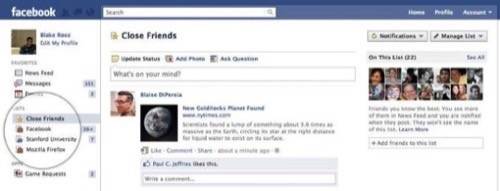
A week ago Facebook got itself caught up in yet another privacy controversy, when old Wall posts from 2007-09 were automatically converted into Timeline posts. The confusion was that for some people, those old posts seemed private in nature. So it was thought that Facebook had mistakenly turned private messages into Timeline posts. Facebook responded that no, it only converted “older wall posts that had always been visible on the users’ profile pages.” That makes sense, but its users have every right to be angry.
The Facebook of 2007-09 is a totally different ballgame to the Facebook of 2012. Here are three of the more obvious reasons why:
- Your Facebook profile page used to be a “Wall” of messages to and from your friends. Now it is a multimedia-filled “Timeline” of your everyday life.
- These days we’re accustomed to using lists to segment our friends. We post different things to different lists.
- Facebook now allows you to post updates publicly, a concept which didn’t exist back in 2009. Related, people you don’t know can now “subscribe” to your public updates.
The upshot: while those old Wall posts probably were always visible on a user’s profile page, that’s a very different thing to those posts being visible on today’s Facebook Timeline.
Even the concept of a “friend” has changed. In 2008, your entire Facebook network may have been what is now labeled “Close Friends”. In 2012, we also have “Acquaintances” (as the name suggests, people you don’t know very well) and “Subscribers” (people you probably don’t know at all). Not to mention the many custom lists we’re encouraged to create – I have one entitled “Tech Influentials”, for example. These aren’t necessarily friends of mine, but they’re people who I befriended for professional reasons.
The point is, being social on Facebook encompasses far more today. Back in 2008, if you posted something on your Wall then it was very likely meant for real-life friends. But nowadays, if you post something to all your Facebook friends, then it will almost certainly be seen by people you don’t know in real life. Some of us have several hundreds of such “friends”. That’s a big change in context.
Put another way: in 2007-09, Facebook was an exclusive, private social network. You had no reason to think that would ever change. But change it did, from December 2009 when Facebook suddenly set the new default for status messages as public. Marshall Kirkpatrick wrote on ReadWriteWeb at the time that “this move cuts against the fundamental proposition of Facebook: that your status updates are only visible to those you opt-in to exposing them to.”
And that’s the crux of this latest privacy bungle from Facebook. Once again, the company has unilaterally decided to impose a new concept of privacy onto its users. It may be technically correct of Facebook to claim that what you posted to your friends via your Wall in 2008 is equivalent to a Timeline post to your friends in 2012. But for most Facebook users today, a friend in 2012 simply doesn’t mean the same thing as a friend in 2008.
So the problem isn’t that Wall posts from 2007-09 “were always public [and] looked like something you might say privately today,” as Gizmodo and other publications are characterizing this.
The problem is that Facebook in 2007-09 was actually a private space. Not quasi-private. Not public-but-looked-like-private. In 2008, Facebook was – hard as it may be to fathom nowadays – private.
But in 2012, that is no longer the case. So when we have something to say to real-life friends, we either use private messaging or we do a post to a small subset of our friends – our “Close Friends” or a custom list of people (such as “Family”).
So this isn’t the fault of Facebook’s users. We knew what we were doing then, when we posted to our Walls. And we know what we’re doing now. The lesson here is that Facebook should have given us the option of selecting the privacy setting for those old Wall posts. Or maybe even made those old posts available to “Close Friends” only, as the default. Then we could adjust if we wished.
Facebook’s mistake was that it had no right to assume that our “Friends” of 2007-09 means the same thing as “Friends” in 2012.
















